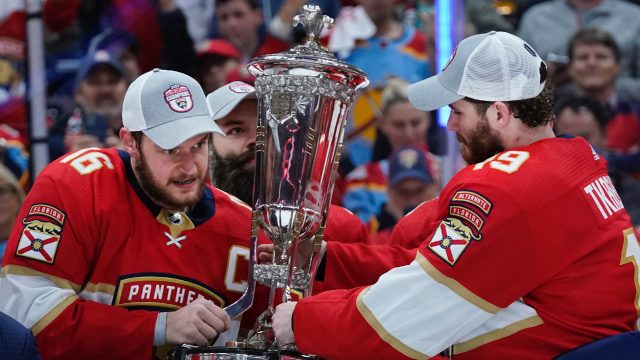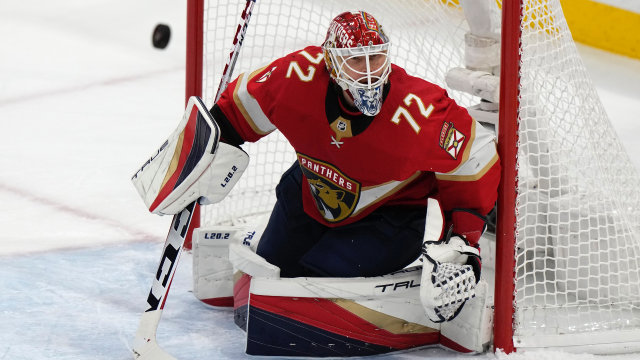
“You want to gain emotions, not lose them.” —Sergei Bobrovsky
LAS VEGAS — Nick Cousins has the perfect example for you.
Twenty nights ago, Sergei Bobrovsky turned in a sparkling 50-save, series-clinching, 75-minute-plus performance in Toronto.
The scrappy, house-money Florida Panthers had knocked off another Stanley Cup contender, part of Bobrovsky’s unconscious 11-1 run against the Eastern Conference elite and his eight-start streak in which he allowed two goals or fewer.
We’re talking stinginess at a silly level.
The clock is nearing midnight, and it’s a toss-up whether the hockey team is more happy or exhausted.
“We’re all walking to the bus together after we just beat Toronto in Game 5 — and he’s on the bike still. So, he’s the last guy in the arena, and he walks back to the hotel by himself,” Cousins recalls.
Bobrovsky missed the bus because he chose to exercise.
“So, he’s riding the bike for 30 minutes while everyone’s leaving the rink. And that’s like an hour and a half after the game. After a series. Even after a series that went to overtime,” Cousins continues.
“I’m just like shaking my head. This guy’s insane.”
To hear Goalie Bob tell it, however, his madness is methodical.
Every step, each movement is plotted and planned.
And his routine, while peculiar and persnickety to the outsider, has been refined through years of trial and error and in conversation with several trainers, goalie coaches and tandem mates.
Hitting the bike and taking the slow way back after an intense four-period playoff game?
“You get a better appetite,” Bobrovsky reasons. “That’s pretty much it. It’s simple.”
At 34 years old, we catch Bobrovsky rewriting his early-Sunrise narrative as the $70-million bust of the blue paint, the last great cautionary tale for general managers tempted to overspend on an all-star goaltender.
When the puck drops Saturday on Game 1 of the Stanley Cup Final — Bobrovsky’s first after 13 years in the league — the guy with the untradable contract and quenchless work ethic will be widely viewed as the Conn Smyth favourite.
Since taking over for AHL call-up Alex Lyon after the Panthers fell down to the mighty Boston Bruins in the opening round, Bobrovsky has posted an 11-2 record, a 2.21 goals-against average, and a .935 save percentage.
“What Bob has been doing is something that very rarely you see this time of year, in probably the history of the game,” Matthew Tkachuk says.
Adds Cousins: “He’s been playing probably the best hockey of his career.”
And coach Paul Maurice: “Of all the people in the room, Sergei would be the one I’m least worried about. He’s got his routine, and he’s fine. Such an incredible professional.”
Bobrovsky is hockey’s take on a method actor.
The poise the Novokuznetsk, Russia, native has exhibited between the pipes on this run — frustrating the likes of David Pastrnak, Auston Matthews and Sebastian Aho — doesn’t vanish when he doffs the mask and pads.
Bobrovsky insists everyday nuisances don’t faze him, treating pet peeves like unfortunate deflections.
Take traffic jams, for instance.
“The traffic is what it is. Nothing you could do about it. You try to think opposite. Sit back and relax. You know, enjoy your car and enjoy what you can see outside. So, I think it’s the way you think, [the way]you look at the things. If you change the perspective, it’s going to be easier for you to control,” Bobrovsky reasons.
“You have to control your mind and especially eliminate all the distractions outside of the focus, because you got enough stress on ice during the games.
“My mind is really short now and really focused on the present.”
Plenty of athletes will say this.
But in speaking with Bobrovsky, there are some distinct Mr. Miyagi vibes in the air.
His strategy? “See the puck. React to puck.”
Every question is considered carefully and responded to with direct eye contact but also with little emotion and no BS.
During the frenzied, directionless podium session that is Stanley Cup Media Day, one reporter dares launch a query about the Ukraine invasion to the Russian.
He doesn’t get angry or defensive. He just gloves it down, no rebound, and awaits the next faceoff.
“Right now, we’re focusing on the hockey. And it’s not about politics or what’s going on in your work. You know, it’s a big hockey celebration — Stanley Cup Final. I never been in that spot before, and I want to enjoy this opportunity and enjoy this,” Bobrovsky replies.
He looks around the room. The Cup, polished and gleaming, sits just a high-slot tip away.
“This atmosphere.”
Everyone connected with the Panthers will speak at length about Bobrovsky’s intense preparation routine and gym-rat habits.
He says he sheds less weight now during games — five or six pounds is normal, and it’s all fluids, not muscle mass — than he did as a younger athlete because he used to waste more energy trying everything, hoping something would help him.
Today, he works smarter, not harder. Eats healthier because he’s more in tune with what his body needs and will reject.
Recovery is critical.
You’ll notice that nearly the whole Panthers team stays out for almost the entire pre-game warmup session. That’s rare. On most teams, it’s one or two keeners that hang around until the warmup buzzer sounds them off.
It’s all about Bob.
“Sixteen minutes, you’re trying to get as much warmup as possible. It’s not that much time,” Bob says in defence.
So precise is the goaltender, he will actually take a longer warmup at road rinks with short walks from the ice back to the visitors’ room and shorter warmups at rinks with longer walks.
“It’s more of a process of letting Bob do his thing,” defenceman Marc Staal says. “So, he pretty much runs the thing. We’re waiting for him to get his stuff done. And then we just jet off the ice.”
Such acute attention to detail, Bobrovsky shares with the last Stanley Cup finalist goaltender Staal helped protect.
“I played in front of Lundqvist for, like, 13 years. Him and Bob aren’t all that much different, to be honest, on game days. Hank was very focused on a game day, and Bob has the same kind of mental prep,” Staal says.
“He’s quiet, and you leave him alone. He does his own thing. But probably the thing that strikes me the most is after a game he’ll be on the bike. He’ll be on the treadmill. And that’s every game, no matter how it goes.”
Mind clear. Eyes forward. Bobrovsky knows he must keep peddling if he’s going to finally climb this mountain, to etch his name on that trophy so near yet still out of reach.
“There is a pressure definitely. But it’s a good pressure,” Bobrovsky says.
“You want to be in that spot. You dream about the situation.”







